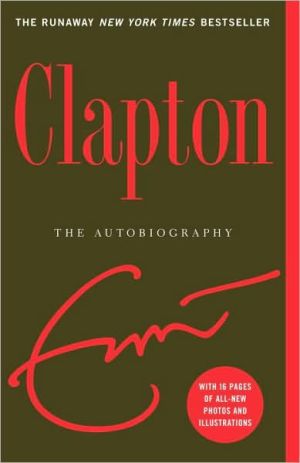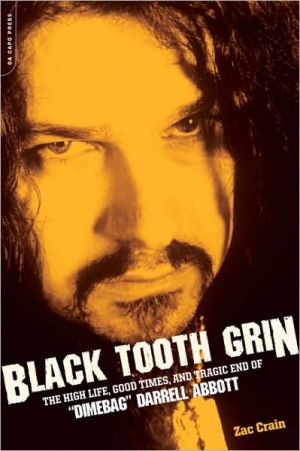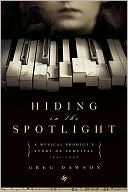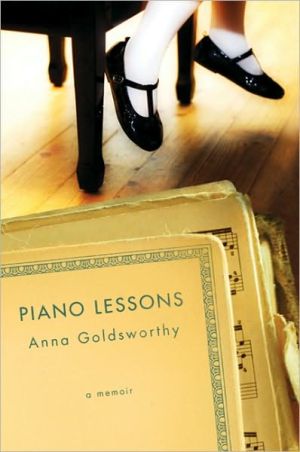Grand Obsession: A Piano Odyssey
Now available in paperback, the critically acclaimed, “lyrical, analytical, yet deeply affecting” (The Washington Post) memoir about one woman’s obsessive search for the perfect piano— and about finding and pursu- ing passion at any age.\ The daughter of a pro- fessional musician, Perri Knize was raised in a home saturated in classical music, but it wasn’t until adult- hood that she returned to the one instrument that mesmer- ized her most: the piano. When, in her forties, Perri decides to...
Search in google:
A fascinating, lyrical memoir about one woman's obsessive search for the perfect piano-and about finding and pursuing passion at any ageHow can a particular piano be so seductive that someone would turn her life upside down to answer its call? How does music change human consciousness and transport us to rapture? What makes it beautiful? In this elegantly written and heartfelt account, Perri Knize explores these questions with a music lover's ardor, a poet's inspiration, and a reporter's thirst for knowledge. The daughter of a professional musician, Knize was raised in a home saturated in classical music, but years have passed since she last played the instrument that mesmerized her most: the piano. Surprised by a sudden, belated realization that she is meant to devote her life to the instrument, she finds a teacher and soon decides to buy a piano of her own.What begins as a search for a modestly priced upright leads Knize through dozens of piano stores all over the country, and eventually ends in a New York City showroom where she falls madly in love with the sound of a rare and pricey German grand."At the touch of the keys, I am swept away by powerful waves of sound," Knize writes. "The middle section is smoky and mysterious, as if rising from the larynx of a great contralto. The treble is bell-like and sparkling, full of color, a shimmering northern lights. A soul seems to reside in the belly of this piano, and it reaches out to touch mine, igniting a spark of desire that quickly catches fire." The seduction is complete. But the piano far exceeds Knize's budget. After a long and painful dalliance, she refinances her house to purchase the instrument thathas transfixed her. The dealer ships it to her home in Montana, and she counts the days until its arrival. When at last she sits down to play, almost delirious with anticipation, the magical sound is gone and the tone is dead and dull. Devastated, she calls in one piano technician after another to "fix" it, but no one can. So begins the author's epic quest to restore her piano to its rightful sound, and to understand its elusive power. This journey leads her into an international subculture of piano aficionados -- concert artists, passionate amateurs, dealers, technicians, composers, and builders -- intriguing characters all, whose lives have also been transformed by the spell of a piano. Along the way she plays hundreds of pianos, new and vintage, rare and common, always listening for the bewitching tone she once heard from her own grand, a sound she cannot forget. In New York, she visits the high-strung technician who prepared her piano for the showroom, and learns how a wire tightened just so, or an artfully softened hammer can transform an unremarkable instrument into one that touches listeners to their core. In Germany, she watches the workers who built her piano shape wood, iron, wool, and steel into musical instruments, and learns why each has its own unique voice. In Austria, she hikes the Alps to learn how trees are selected to build pianos, and how they are grown and harvested. With each step of her journey, Knize draws ever-closer to uncovering the reason her piano's sound vanished, how to get it back, and the deeper secret of how music leads us to a direct experience of the nature of reality.Beautifully composed, passionately performed, Grand Obsession is itself a musical masterpiece. The Washington Post - Eugenia Zukerman Knize's passion for her piano is intense, and if it seems excessive, she nonetheless hooks you into her obsession with writing that is lucid yet lyrical, analytical yet deeply affecting. From the opening of her "prelude," you know you're in the hands of an observant naturalist with an artist's sensibility…Along with its moving personal narrative, Grand Obsession offers a comprehensive lesson in piano making, piano tuning, piano delivery, piano everything, and it's all fascinating.
Epiphany\ In the autumn of my forty-third year, I remembered, quite unexpectedly, that I was meant to be a pianist.\ I was alone in my car, on my way to spend a weekend with friends. I fumbled through a box of cassette tapes I kept on the front passenger seat and found one my brother gave me: pianist Arthur Rubinstein performing Chopin waltzes. This might make a good soundtrack for the trip, I thought, and I pushed the cassette into the tape deck.\ From the opening notes of Opus 18 — quick, percussive repetitions of B-flat — the car seemed to rock in sympathy to the driving three-quarter-time beat, taken at a wildly joyous tempo. Rubinstein's complete freedom within the music astonished me, and his abandonment to it was contagious — the music seemed to enter my pulse and carbonate my blood.\ Meanwhile, through the windshield, Montana's luminous Indian summer performed a fitting accompaniment: a sapphire sky hung behind the Elkhorn Mountains, where tawny grasses gleamed in the lowering sun. Quaking aspen lined the banks of the Boulder River; their burnished leaves turned up their bellies to the wind and trembled in unison, a ribbon of gold threading its way up the valley.\ I found myself gripping the steering wheel, as if I were hanging on for the ride, gripped myself by a piano-induced rapture that was as sweet as it was searing.\ This is all that I want to do with my life. These words arose as if from nowhere in my mind, astonishing me. This is all that I want to do with my life. They hit with the force of an inner directive that cannot be questioned. They arose again and again, as if rising on the swells of the music itself.\ The beauty of the day intensified the heartbreak: I felt as if I'd missed an urgent and critical appointment that could never be rescheduled. I had reached my own autumn, and the leaves would soon fall. How then could I devote my life to the piano? Copyright © 2008 by Perri Knize
\ Emma BrockesIn the best tradition of the memoir, Perri Knize's Grand Obsession starts as a simple shopping expedition and ends in total existential collapse. It recounts the author's increasingly feverish addiction to the piano—first to buying one, then to getting the right sound out of it. It's a mark of her deftness that despite the esoteric subject matter, it reads at the pace of a mystery and the pitch of a love story. It is no small feat getting the reader to care about a problem that turns on words like "flanges" and "hammerless shanks," but Knize succeeds; by the end of the story, when Knize is told she "fell in love with an illusion," it has the weight of tragedy.\ —The New York Times\ \ \ \ \ Eugenia ZukermanKnize's passion for her piano is intense, and if it seems excessive, she nonetheless hooks you into her obsession with writing that is lucid yet lyrical, analytical yet deeply affecting. From the opening of her "prelude," you know you're in the hands of an observant naturalist with an artist's sensibility…Along with its moving personal narrative, Grand Obsession offers a comprehensive lesson in piano making, piano tuning, piano delivery, piano everything, and it's all fascinating.\ —The Washington Post\ \ \ Publishers WeeklyEmbarking on piano lessons in middle age, environmental journalist Knize sets out on an ancillary quest to find the perfect piano on a limited budget. She scours North America's piano outlets, immerses herself in the colorful online subculture of piano aficionados and grows fluent in the language of keyboard connoisseurship ("a thin, shrill, brittle treble," she sniffs at a Steinway). Then she falls in love with "Marlene," a Grotrian-Steinweg grand with the "sultry and seductive" tone of Dietrich herself; she's so smitten that she mortgages her house to buy it. Then disaster strikes: when shipped from the New York showroom to her Montana home, the piano sounds "weird and echoey," and its glorious treble is dead. Desperate to restore Marlene's voice, Knize mobilizes an army of eccentric piano technicians (these lowly craftsmen emerge as wild-eyed artists in their own right), delves into the subtle intricacies that influence a piano's sound and ponders the haunting evanescence of music. Sometimes the mysticism-music " 'is a way of exiting the petty self and entering the Over-soul... [i]t's about existing at a certain vibration' "-gets thick enough to cut with a knife. But Knize writes in a wonderfully evocative, lushly romantic style, and music lovers will resonate to her mad pursuit of a gorgeous sound. (Jan.)\ Copyright 2007 Reed Business Information\ \ \ \ \ Library JournalEnvironmental policy reporter Knize has crafted a poetic tribute to the piano of her dreams, a 2000 Grotrian-Steinweg she nicknames Marlene after chanteuse and actress Dietrich. The book details her travails as she takes up piano, her two-year search for an instrument that speaks to her, and the various piano stores, warehouses, and rebuilding workshops she visits along the way. We rejoice with Knize upon her discovery of Marlene and sympathize when the instrument she loved in New York changes on its trip through blizzards to Montana where she makes her home. Characters she meets introduce her to anthroposophy and Sufism, along with technical physics terminology about tuning and voicing as they attempt to restore her piano to what it was when she first played it; she even travels to the Grotrian factory in Germany and to Austrian spruce woods (where certain piano parts are derived) to gain insight. Narrated in a friendly way and reminiscent of portions of Noah Adams's Piano Lessonsand James Barron's Piano, Knize's book is warmly recommended for all collections.\ —Barry Zaslow\ \ \ \ \ \ Kirkus ReviewsSincere, focused memoir chronicles the author's quest to plumb her obsession with a particular piano. An environmental-policy reporter and daughter of a professional clarinetist, Knize, at age 43, had the epiphany that she should resurrect her childhood dream of becoming a pianist. After beginning lessons and overcoming stage fright, she embarked on a hunt for a piano of her own, given immediacy here by her use of the present tense. The Yamahas sound too bright, the Bluthners too saccharine, the Astin-Weights too booming. The transcendent experience she seeks seems out of reach until she encounters her soul mate at Beethoven Pianos in Manhattan. There, a Grotrian Cabinet grand has a complex, sultry sound that leads Knize to christen the instrument Marlene (as in Dietrich). The author makes Marlene's delivery to Missoula, Mont., sound like a virgin being disrobed, a conceit that plays into her extended metaphor of the pianist/piano relationship being like a marriage. The honeymoon ends when Marlene's treble dies, a difficulty that a series of technicians attempt to solve through tuning, replacing hammers and voicing (regulating the tone). Desperate to heal Marlene and still fascinated by the emotional connection she feels with the piano, Knize travels to New York to see the high-strung, brilliant technician who voiced Marlene. Armed with literature about the healing power of music and inspired by a teacher's comment that Marlene's vibrational energy is a combination of everyone who worked on her, the author travels to Germany and Austria to meet kindred spirits at the piano factory where Marlene was constructed and the forest where her wood was cut. Articulating precisely the way musicmakes us feel may be nearly impossible, but Knize makes a commendable attempt, combining synesthetic flourishes of language with a journalistic attack on the experience. A well-written, heartfelt, classy paean to a singular instrument.\ \








